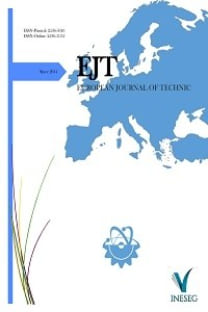INVESTIGATION OF EXTERNEL BONDED PATCH REPAIR OF LAMINATED COMPOSITE MATERIALS EXPERIMENTALY
Laminate Composite Materials, bonded repair patch, adhesive, failure strengt,
___
- 1. Liu X., Wang G. (2007). Progressive failure analysis of bonded composite repairs. Composite Structures, 81, 331-340.2. Papanikos P., Tserpes K.I., Pantelakis Sp.(2007). Initiation and progression of composite patch debonding in adhesively repaired cracked metallic sheets. Composite Structures, 81, 303-311.3. Xiaoquan C.,Baig Y., Renwei H., Yujian G., Jikui Z., (2013). Study of tensile failure mechanisms in scarf repaired CFRP laminates. International Journal of Adhesion & Adhesives, 41, 177-185.4. Breitzman T.D., Larve E.V., Cook B.M., Schoeppner G.A., Lipton R.P. (2009), Optimization of a composite scarf repair patch under tensile loading. Composites: Part A, 40, 1921-1930.5. Tse P.C., Lau K.J., Wong W.H. (2002), Stress and failure analysis of woven composite plates with adhesive patch-reinforced circular hole. Composites: Part B, 33, 57-65.6. Jones R., Chiu W.K. and Smith R., (1995), Airworthiness of Composite Repairs: Failure Mechanisms. Engineering Failure Analysis, 2, 117-128.7. Cheng P., Gong X. J. , Hearn D., Aivazzadeh S., (2011), Tensile behaviour of patch-repared CFRP laminates. Composite Structures, 93, 582-589.8. Her S. C. (1999), Stress analysis of adhesively-bonded lap joints. Composite Structures, 47, 673-678.9. Campilho R.D.S.G., Moura M.F.S.F., Domingues J.J.M.S., (2009), Numerical prediction on the tensile residual strength of repaired CFRP under different geometric changes. International Journal of Adhesion & Adhesives, 29, 195-205.10. Wisnom M. R., (1999), Size effects in the testing of fibre-composite materials. Composites Science and Technology, 59, 1937-1957.11. Madani K., Touzain S., Feaugas X., Cohendouz S., Ratwani M., (2010), Experimental and numerical study of repair techniques for panels with geometrical discontinuities. Computational Materials Science, 48, 83-93.12. Goyal V.K., Johnson E.R., Goyal V.K., (2008), Predictive strength-fracture model for composite bonded joints. Composite Structures, 82, 434-446.13. Davis M., Bond D., (1999), Principles and practices of adhesive bonded structural joints and repairs. International Journal of Adhesion & Adhesives, 19, 91-105.14. Caminero M.A., Pavlopoulou S., Lopez-Pedrosa M., Nicolaisson B.G., Pinna C., Soutis C., (2013), Analysis of adhesively bonded repairs in composites: Damage detection and prognosis. Composite Structures, 95, 500-517.
- ISSN: 2536-5010
- Yayın Aralığı: 2
- Yayıncı: INESEG Yayıncılık A.Ş.
Kenan SAKA, İbrahim Halil YILMAZ, Ahmet Serhan CANBOLAT, Ömer KAYNAKLI
DYNAMIC MODEL AND CONTROL OF 2-DOF ROBOTIC ARM
Mesut HÜSEYİNOĞLU, Tayfun ABUT
Abdulkadir ŞENGÜR, Ümit BUDAK, Yaman AKBULUT
MATHEMATICAL MODELS TO DETERMINE OF THIN LAYER DRYING KINETIC OF GINGER SLICES
Ebru KAVAK AKPINAR, Seda DEMİRCİ
NEW SWARM INTELLIGENCE BASED OPTIMIZATION ALGORITHMS FOR THE OPTIMIZATION OF MICROGRIDS
Bilal ALATAŞ, Tuba TANYILDIZI AĞIR, Zafer AYDOĞMUŞ
ENERGY POTENTIAL OF ANIMAL BIOMASS IN TURKEY
